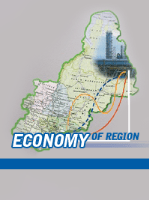
Economy of Region
Scope & Guideline
Bridging Theory and Practice in the Economy of Regions
Introduction
Aims and Scopes
- Regional Economic Development:
The journal examines economic development strategies tailored to specific regions, including the analysis of growth drivers, barriers, and the impact of policies on regional economies. - Sustainability and Environmental Economics:
Research often incorporates sustainability considerations, exploring the economic implications of environmental policies, climate change, and resource management. - Human Capital and Labor Market Dynamics:
Articles frequently address the role of human capital in economic development, including labor market trends, educational impacts, and migration patterns within regions. - Infrastructure and Connectivity:
Infrastructure development, including transport, ICT, and energy systems, is a critical focus area, analyzing how these factors influence regional economic performance. - Digital Transformation and Innovation:
The journal explores the implications of digital technologies on regional economies, emphasizing innovation, digitalization, and their impact on competitiveness. - Comparative Regional Analysis:
It provides comparative studies of regional economies, assessing differences in development trajectories, policy impacts, and socio-economic conditions. - Policy Analysis and Strategic Planning:
The journal includes evaluations of regional policies and strategic planning frameworks, assessing their effectiveness and alignment with national and international goals.
Trending and Emerging
- Climate Change and Economic Adaptation:
There is an increasing emphasis on the economic implications of climate change, particularly how regions can adapt their economies to mitigate risks associated with environmental changes. - Digitalization and Smart Cities:
The trend towards digital transformation in regional economies is gaining traction, with a focus on smart city initiatives and the integration of digital technologies in urban planning and management. - Impact of COVID-19 on Regional Economies:
Research related to the socio-economic impacts of the COVID-19 pandemic is emerging as a significant theme, exploring recovery strategies and resilience in regional economies. - Sustainable Development Goals (SDGs):
There is a growing alignment of research with the United Nations Sustainable Development Goals, focusing on how regional policies can contribute to achieving these global objectives. - Social Equity and Inclusive Growth:
Emerging studies are increasingly addressing social equity issues, exploring how regional economic policies can ensure inclusive growth and reduce disparities among different populations. - Regional Innovation Ecosystems:
Research on the development of regional innovation ecosystems is trending, emphasizing collaboration among universities, businesses, and governments to foster innovation and economic growth.
Declining or Waning
- Agricultural Economics:
While still relevant, the frequency of articles focusing specifically on agricultural economics has decreased, possibly due to a broader shift towards urban and industrial economic issues. - Traditional Industrial Analysis:
Research centered on traditional industries, particularly in the context of older industrial regions, appears to be waning as attention shifts to innovative and technology-driven sectors. - Static Economic Models:
There has been a noticeable reduction in papers employing static economic models, with a trend towards dynamic and agent-based modeling approaches that account for rapid changes in regional economies. - International Trade in Traditional Goods:
Studies focusing on international trade dynamics, particularly for traditional goods, seem to be less prevalent, as the emphasis moves towards new trade challenges and digital economies. - Historical Economic Studies:
Research that primarily focuses on historical economic analysis of regions is becoming less common, as contemporary issues and future projections gain more attention.
Similar Journals

Prague Economic Papers
Shaping the Future of Economic Discourse in PraguePrague Economic Papers is an esteemed scholarly journal dedicated to the fields of Economics, Finance, and Econometrics, published by UNIV ECONOMICS-PRAGUE. With its ISSN 1210-0455 and E-ISSN 2336-730X, this journal serves as a vital platform for innovative economic research and theoretical advancement. Operating from the scenic backdrop of the Czech Republic, Prague Economic Papers is recognized in Scopus with rankings that place it in quartile Q4 for Economics and Econometrics, as well as Q3 for Finance, reflecting its growing impact in the academic sphere. Though the journal does not currently offer open access, it ambitiously covers a wide expanse of economic theories and empirical studies, contributing significantly to the evolution of economic thought from 2008 to 2024. Researchers, professionals, and students alike will find this journal essential for accessing critical insights and methodologies that shape contemporary economic discourse.
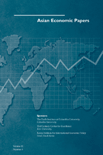
Asian Economic Papers
Delivering high-impact research on Asian economies.Asian Economic Papers, published by MIT Press, is a premier academic journal that delivers cutting-edge research in the dynamic fields of economics and political science with a specific focus on Asian economies. Since its inception in 2008, the journal has carved out a significant niche, reflected in its impressive 2023 Scopus Rankings; including a Q1 categorization in Political Science and International Relations, and Q2 rankings in both Economics and Finance. With a rigorous peer-review process, it aims to foster scholarly discourse on economic policies, practices, and research relevant to Asian contexts. Although not an open-access journal, it presents a valuable contribution to the academic landscape, making it indispensable for researchers, professionals, and students seeking insightful analysis and data-driven studies. Based in Cambridge, MA, Asian Economic Papers holds a notable reputation for its high-impact output and continues to be pivotal in shaping economic thought and policy in Asia and beyond.
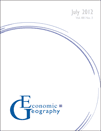
ECONOMIC GEOGRAPHY
Mapping Economic Trends through Geographical LensesECONOMIC GEOGRAPHY, published by Taylor & Francis Ltd, is a premier journal in the fields of Economics and Geography, acclaimed for its rigorous exploration of the spatial dynamics of economic processes. With an ISSN of 0013-0095 and E-ISSN of 1944-8287, this journal boasts a remarkable standing reflected in its 2023 Q1 category rankings in both Economics and Econometrics and Geography, Planning and Development. Positioned within the top percentile of its categories in Scopus rankings, it is a vital resource for researchers, professionals, and students seeking to understand the complex interplay between economic activities and geographical contexts. Published in the United Kingdom, the journal maintains a rich archive dating back to its inception in 1972, making it a significant repository of knowledge for those examining economic geography across decades. While not an open-access journal, its in-depth articles provide crucial insights into pressing economic issues and contribute to advancing scholarly discourse in the discipline.
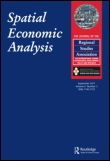
Spatial Economic Analysis
Exploring the Nexus of Space and EconomicsSpatial Economic Analysis, published by Routledge Journals, Taylor & Francis Ltd, stands at the forefront of interdisciplinary research bridging economics, geography, and environmental science. With a notable impact factor reflected in its prestigious Q1 quartile rankings across key categories such as Earth and Planetary Sciences, Economics, Econometrics and Finance, and Geography, this journal is pivotal for scholars seeking to understand the intricate dynamics of spatial phenomena and their economic implications. Its comprehensive scope and rigorous peer-review process ensure that only high-quality research is disseminated, fostering innovative solutions to pressing global challenges. As of 2024, and since its inception in 2006, Spatial Economic Analysis continues to thrive as a vital platform for researchers, professionals, and students alike, facilitating access to cutting-edge studies that shape the future of spatial economics and policy.
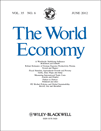
WORLD ECONOMY
Advancing insights into the global economic landscape.WORLD ECONOMY is a premier academic journal published by Wiley, renowned for its rigorous peer-reviewed research in the fields of economics, finance, accounting, and political science. Established in 1977, the journal has consistently contributed to the advancement of knowledge, reflected in its strong standing across various category quartiles, notably achieving Q1 in Accounting and Political Science, and ranking in the top quartile in its respective disciplines as of 2023. With an audience that spans researchers, professionals, and students, WORLD ECONOMY publishes impactful articles that explore critical issues affecting the global economy. Although it is not an open-access publication, readers have access options to engage with cutting-edge research that addresses both theoretical and practical aspects of world economic trends. The journal's commitment to excellence is further underscored by its impressive Scopus rankings, situating it among the top journals in the social sciences arena. For anyone keen on deepening their understanding of the dynamics shaping our economic landscape, WORLD ECONOMY remains an indispensable resource.

CHINA ECONOMIC REVIEW
Transforming Understanding of China’s Economic LandscapeChina Economic Review, published by Elsevier Science Inc, stands as a leading academic journal dedicated to the rigorous exploration of economic and financial issues pertinent to China and its place in the global economy. Established in 1989, this journal has built a robust reputation over the years, achieving a prestigious Q1 ranking in both Economics and Econometrics and Finance as of 2023. With a Scopus rank placing it in the top 93rd percentile for both categories, the journal serves as a vital resource for researchers, policymakers, and students alike, facilitating a deeper understanding of China’s economic dynamics. Although not an Open Access publication, articles are rigorously peer-reviewed, ensuring high-quality contributions that advance the field. With the scope covering a diverse range of topics, from market trends to fiscal policies, China Economic Review remains essential for those looking to engage with cutting-edge research and insights into one of the world's largest economies.
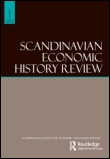
SCANDINAVIAN ECONOMIC HISTORY REVIEW
Charting the Course of Scandinavian Economic EvolutionSCANDINAVIAN ECONOMIC HISTORY REVIEW, published by ROUTLEDGE JOURNALS, TAYLOR & FRANCIS LTD, stands as a significant scholarly platform dedicated to the exploration and analysis of economic history within the Scandinavian context. With an ISSN of 0358-5522 and an E-ISSN of 1750-2837, this journal has been publishing high-quality research since 1953 and continues its contribution to academia with a projected publication span extending to 2024. Renowned for its rigorous scholarship, the journal enjoys a commendable standing in the academic community, reflected in its Q1 classification in History and its competitive rankings across multiple categories. The journal particularly champions transdisciplinary approaches, encouraging researchers to engage with economic history through various lenses including the arts, humanities, and social sciences. Despite operating on a traditional access model, the impactful content delivered within its pages offers invaluable insights for researchers, professionals, and students striving to deepen their understanding of the economic transformations in Scandinavian societies.
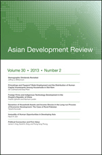
Asian Development Review
Connecting Ideas and Innovations for a Brighter AsiaThe Asian Development Review, published by World Scientific Publishing Co Pte Ltd, is a distinguished journal that has been at the forefront of scholarly discourse in the fields of development, economics, and geography since its inception in 1987. With an Open Access model adopted in 2013, this journal strives to enhance the accessibility of high-quality research, facilitating a broader dissemination of vital knowledge and insights that address pressing socio-economic challenges across the Asian landscape. The journal is classified in the Q2 Quartile category for 2023 in Development, Economics and Econometrics, as well as Geography, Planning, and Development, reflecting its substantial contribution to these fields. The journal also holds respectable rankings in Scopus, placing it in the top 45-55th percentile across various disciplines. Researchers, professionals, and students are encouraged to explore the wealth of research and methodologies presented in this impactful publication, which not only seeks to illuminate current issues but also aims to inform policy and practice across the Asian region.

Journal of Competitiveness
Fostering dialogue among business and economic leaders.Journal of Competitiveness is a leading scholarly publication dedicated to advancing knowledge in the realms of business, management, and economics. Published by UNIV TOMASE BATI & ZLINE, FAK MANAGEMENTU EKONOMIKY in the Czech Republic since 2009, this Open Access journal provides unrestricted access to high-quality research, fostering a global discourse among academics, practitioners, and policymakers. With a prestigious placement in the Q1 quartile across multiple categories—including Business, Management and Accounting, as well as Economics, Econometrics, and Finance—the journal demonstrates exceptional impact and relevance, boasting a rank of 2nd out of 288 in General Economics and 12th out of 218 in General Business. Covering diverse topics and methodologies, the Journal of Competitiveness serves as a vital resource for those seeking to enhance their understanding of competitive dynamics and market strategies in a rapidly evolving global landscape. Engaging with current trends and fostering innovative ideas, this journal is essential for anyone looking to contribute to or stay informed in the fields of economics and business.
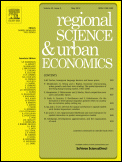
REGIONAL SCIENCE AND URBAN ECONOMICS
Navigating the future of cities through rigorous analysis.Regional Science and Urban Economics, published by Elsevier, is a premier academic journal dedicated to advancing the understanding of spatial dynamics and urbanization. With an ISSN of 0166-0462 and E-ISSN 1879-2308, this journal has established itself as a vital resource for researchers and practitioners in economics and urban studies, boasting a remarkable impact factor and ranking in the Q1 category for both fields. Since its inception in 1975, the journal has provided a platform for high-quality research that examines both theoretical and empirical aspects of regional science and urban economics. With a Scopus rank of 47th in Urban Studies and 157th in Economics, it ensures that the latest findings reach a wide audience. Researchers interested in exploring spatial economics and urbanization trends will find this journal indispensable for staying at the forefront of their fields, facilitating collaboration and innovation in addressing contemporary urban challenges.